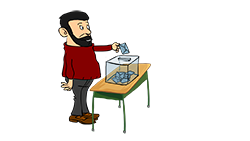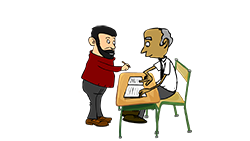D_EN_P03
Election of delegates

D_EN_P03_E01
D_EN_P03_E01

Introduction
What is democracy?
D_EN_P03_E02
D_EN_P03_E02_img

D_EN_P03_E03
decryptage 1

decryptage 2

decryptage 3

decryptage 4

decryptage 5

D_EN_P03_E04
Messages clés
- Being an elected representative means having responsibilities.
- In France, all adult citizens have the right and duty to vote: it is an act of citizenship.
- Women have had the right to vote in France since 1944.
- Cheating in an election, whether you are a candidate or a voter, is punishable by law.
D_EN_P03_E05
drag0:drop0

drag0_feedback
The noticeboards are there to inform voters about candidates and their political affiliation.
It is the first stage in an election – you need to know who is running in an election so that you can choose who to vote for.
drag1:drop1

drag1_feedback
The vote must stay secret : nobody should know who you are going to vote for. That’s why voters take at least two ballot papers.
To ensure democracy, the vote must not be under any pressure.
If people know who you’re voting for (e.g. if you only take one ballot paper), they might try to change your mind !
drag2:drop2

drag2_feedback
The POLLING BOOTH means you are alone when you vote, so that nobody can influence you.
You are alone in the booth, hidden by a curtain.
Nobody can see who you vote for.
drag3:drop3

drag3_feedback
You must present your ID and voting card so that your identity, age and registration on the electoral roll can be confirmed.
In France, anyone aged 18 or over who is of French nationality (or European for certain elections), registered on the electoral roll and has not had their civil rights revoked may participate in an election.
drag4:drop4

drag4_feedback
The voter slides the ballot paper into the ballot box. The ballot box is supervised and kept closed in order to prevent fraud.
‘Assessors’ watch the ballot box to make sure you only submit one ballot paper.
drag5:drop5

drag5_feedback
The register not only prevents multiple votes, but also shows how many people came to vote.
drop0

drop1

drop2

drop3

drop4

drop5

consigne
Put the different stages in an ELECTION in the right order.
If you get it right, a note will explain the purpose and the importance of that stage.
configuration
dropTopMargin:0
max:1
scaleOnSelect:0.55
